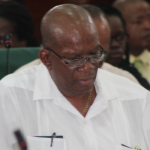
Despite repeated objections from the main opposition – A Partnership for National Unity + Alliance For Change (APNU+AFC), the Government today defended its move to increase the country’s debt ceiling by some $250B.
In defending his motion to the House, Minister of Finance, Dr Ashni Singh said the increase in the domestic public debt ceiling to $750B, up from $500B, and the increase in the external borrowing ceiling to $900B from its existing level of $650B, is intended to accelerate the Government’s development agenda.
“This Government has given a commitment to the people of Guyana, that we will be delivering development to them in an accelerated manner,” Minister Singh told the House.
In response to growing concerns from the Opposition about the increasing external debt being incurred by the Government, Minister assured the House that the Government has been prudently managing the country’s financial resources including its debt.
“The proposed adjustments to the debt ceiling that we have brought to this Parliament, keep Guyana firmly within the boundaries of a highly sustainable debt position and very strong debt and fiscal sustainability. In fact, sir, if you compare Guyana’s debt to GDP ratio, today, we rank among the countries with the lowest debt to GDP ratio across the entire hemispheres, a reflection of sustained prudent management by the People’s Progressive Party in Government,” the Finance Minister said.
As he sought to round up support for the proposed increase in the debt ceilings, Minister Singh said prior 1992, Guyana was highly indebted due to the poor management of the country’s financial resources.
“It is a well-known fact that under the People’s National Congress, Guyana’s debt had accumulated to a level in excess 600% of our Gross Domestic Product, more than six times the size of the economy. It is well known fact Sir, that under the PNC, prior to 1992, we were spending in excess of 100% of government revenue to service our debt. Today, sir, we have reduced not only our debt stock but our debt service obligations to the point sir, where our debt stock now stands in the vicinity of 25% of the size of our economy, moving from six or seven times the size of the economy to a quarter of the size of the economy,” Minister Singh told the House.
Further, he told the House that the APNU+AFC, while in Government, had incurred an illegal overdraft and concealed it, even as it refused to adjust the debt ceiling.
Minister of Housing and Water, Colin Croal and Minister of Human Services and Social Security, Dr Vindhya Persaud were among Government MPs, who supported the motion, as they spoke about developments unfolding across the various sectors, including in the areas of Housing, and Social Services.
But APNU+AFC Member of Parliament Juretha Fernandes, in opposing the motion to increase the country’s debt ceiling, said contrary to the picture painted by the Finance Minister, the Government continues to misuse the country’s resources, even as it continues to add debt burden on the shoulders of current and future generations.
MP Fernandes told the House that already for 2023, the Government has taken in excess of U$700M in loans in 2023– US$262.9M more than the oil revenues garnered during the first quarter of the year.
“Mr. Speaker, there are several risks associated with borrowing against projected oil revenues oil-dependent economies like Guyana – a nation that is now heavily reliant on oil exports as a primary source of revenue. Our country now faces unique challenges due to the volatile nature of oil prices, which can fluctuate unpredictably based on global supply and demand dynamics,” she said.
Pointing to the Bank of Guyana Report on the First Quarter of 2023, the APNU+AFC MP said, according to the report, the country’s total stock of public and publicly guaranteed debt, which comprises both external and domestic debt, increased by 2.3 percent to over US$3.7 billion compared to 2022.
She warned that there is a danger associated with raising debt ceiling in oil-dependent countries like Guyana, explaining that when a country’s debt ceiling is raised, it might be interpreted as an opportunity for unchecked spending to stimulate economic growth. However, she said such an approach will be highly detrimental in the long run.
MP Amanza Walton-Desir, was also among the Opposition MPs, who stood in objection of the motion.
The motion comes just two years after the Government increased both the domestic and external debt ceilings to $500B and $560B.













You must be logged in to post a comment Login